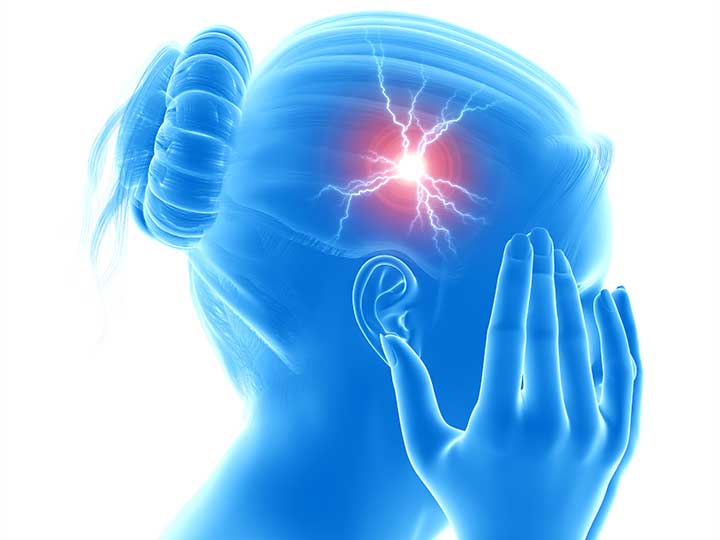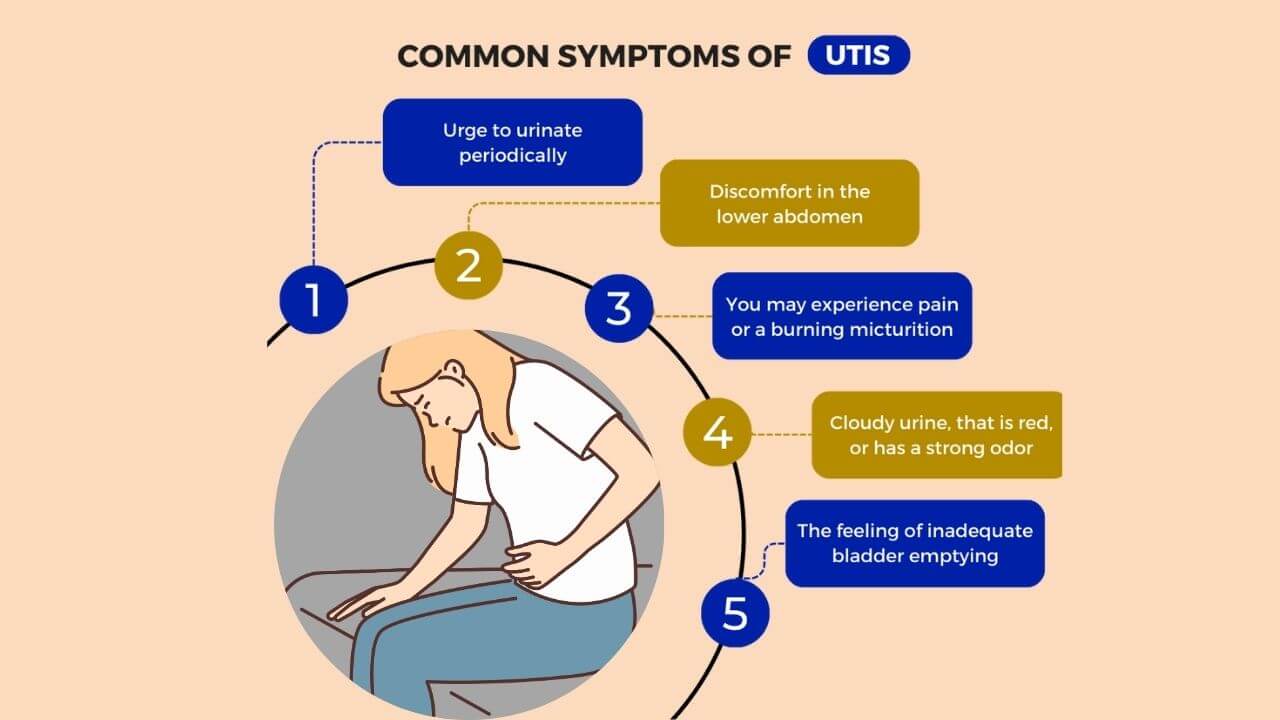Can UTI Cause Migraine: – A UTI does not directly cause migraines, but the stress and discomfort it causes may trigger a migraine in susceptible individuals. Migraines are complex and can be set off by various health issues.
Urinary Tract Infections (UTIs) and migraines both disrupt the lives of many, yet their direct connection is often misunderstood. Understanding the impact of a UTI on the body reveals that while it doesn’t directly cause migraines, the stress and pain from a UTI might lead to a migraine in some people.
Migraines are a neurological condition characterized by intense headaches and sensory disturbances, and they can be exacerbated by physical stress or illness. While UTIs typically involve symptoms like burning sensations during urination, frequent urination, and abdominal pain, they can also induce enough discomfort to potentially trigger a migraine episode in those with a history of these headaches. It’s essential to consider individual health profiles, as the relationship between various ailments can be complex and multifaceted.
Introduction To Utis And Migraines
Welcome to exploring the connection between urinary tract infections (UTIs) and migraines. Understanding these conditions is crucial in recognizing their potential link.
Brief On Utis
Urinary tract infections are common and uncomfortable. They happen when germs get into the urinary tract. Symptoms often include a strong urge to urinate and a burning sensation. Women are more prone to UTIs than men.
Migraine Basics
Migraines are more than just headaches. They bring severe, throbbing pain, often on one side of the head. Sufferers may experience nausea and light sensitivity. Hours or days can pass between migraine attacks.
Symptoms Of UTIs and Migraines
Understanding the symptoms of UTIs and migraines is crucial for effective treatment. While they are distinct conditions, both can significantly disrupt daily life. A Urinary Tract Infection (UTI) often causes discomfort and pain, while a migraine can lead to severe headaches and other symptoms. Identifying the symptoms might help provide timely comfort and care.
Identifying Uti Symptoms
UTIs are infections in any part of the urinary system. Common symptoms include:
- Frequent urge to urinate
- Burning sensation during urination
- Urine that appears cloudy or red
- Foul-smelling urine
- Pelvic pain in women, especially in the center of the pelvis and around the area of the pubic bone
It’s essential to seek medical advice if these symptoms persist.
Recognizing Migraine Signs
Migraines are more than just headaches. They can present with a variety of symptoms:
| Symptom | Description |
|---|---|
| Intense Headache | Pain is often on one side of the head. |
| Sensitivity to Light/Sound | Loud noises and bright lights might exacerbate the pain. |
| Nausea | Feeling sick to the stomach is common. |
| Vomiting | This may accompany nausea. |
| Visual Disturbances | Flashing lights or zig-zag lines may occur before headache. |
Acting quickly at the onset of migraine signs can help manage symptoms effectively.
Physiological Stress And Pain Response
Understanding the connection between urinary tract infections (UTIs) and migraines starts with recognizing how the body responds to stress. Stress from a UTI can trigger a complex pain response, leading to headaches or even migraines in some individuals.
Body’s Reaction To Infections
The body responds to infections like UTIs by activating the immune system. This response often includes:
- Inflammation to fight off the invaders.
- Release of stress hormones such as cortisol.
- Elevation of body temperature which can cause discomfort.
This physical stress can contribute to the onset of a migraine.
Pain Mechanisms In Migraines
Migraines involve specific pain mechanisms, including:
- Sensory amplification, where normal light or sounds become painful.
- Neuroinflammation is swelling in the brain that heightens pain.
- Activation of the trigeminal nerve, a critical pain pathway in migraines.
A UTI can exacerbate these mechanisms, possibly leading to a migraine.
The Connection Between Inflammation And Headaches
The Connection Between Inflammation and Headaches explores how body responses to infections might trigger headaches. This section delves into urinary tract infections (UTIs) and migraines, focusing on inflammation’s role.
Inflammatory Responses In Utis
UTIs cause discomfort and pain, signaling the body’s fight against infection. In response, the immune system releases molecules that cause inflammation. These substances aim to eliminate bacteria but can also trigger headache symptoms. Here’s a breakdown of this process:
- Immune Activation: The body detects infection.
- Chemical Release: Inflammatory mediators like cytokines are released.
- Pressure Increase: These chemicals increase blood flow, causing pressure.
- Headache Trigger: Increased pressure and inflammation may lead to headaches.
Inflammation’s Role In Migraines
Migraines are not just headaches but complex neurological events often linked to inflammation. During a migraine, inflammatory substances activate nerve endings in the brain. This activation causes the severe pain experienced during an attack. Below is a simple explanation:
- Trigger: An inflammatory response begins.
- Nerve Activation: Inflammatory chemicals stimulate nerve endings.
- Pain Response: This stimulation results in migraine pain.
Understanding this link helps manage symptoms effectively and reduce migraine frequency.
UTIs and migraines highlight how our body’s inflammatory response, while essential for fighting infections, can lead to unintended consequences like headaches.
Dehydration: A Common Link
Understanding health conditions often means looking at the connections between symptoms. One such link is dehydration, which can occur with a urinary tract infection (UTI) and may lead to migraines. This section explores how UTIs may cause dehydration and the impact of dehydration on migraines.
Utis And Risk Of Dehydration
UTIs often make us feel the need to urinate more frequently. This can lead to loss of fluids. If not managed, it may result in dehydration. It’s essential to recognize the signs:
- Increased thirst
- Dry mouth
- Less frequent urination
- Dark-colored urine
Drinking plenty of water is critical in preventing dehydration when dealing with a UTI.
Dehydration’s Impact On Migraines
Dehydration can trigger migraines in some people. The body needs adequate fluids for all functions. When fluid levels drop, it can lead to:
- Headache
- Dizziness
- Nausea
- Sensitivity to light
To reduce the risk of migraines, staying hydrated is crucial, especially when dealing with a UTI.

Credit: www.draliabadi.com
Hormonal Fluctuations And Their Effects
Understanding the intricate relationship between bodily functions is key to managing health. Hormonal fluctuations can have a wide range of effects on the body. They can influence mood, metabolism, and even susceptibility to certain conditions. For individuals prone to urinary tract infections (UTIs) and migraines, hormonal changes can be a significant trigger for discomfort and pain.
Utis Influence On Hormones
UTIs occur when bacteria enter the urinary system. This condition can lead to increased stress and an inflammatory response. Such stress impacts the body’s hormonal balance. Specifically, it can cause a spike in cortisol, the stress hormone. High cortisol levels may disrupt other hormones, potentially leading to a chain reaction of hormonal imbalance.
Hormonal Triggers For Migraines
For many, migraines are closely linked to hormonal fluctuations. Estrogen, an essential hormone, regulates the menstrual cycle and can affect the brain’s chemicals. A drop in estrogen levels is a common trigger for migraines. This can happen naturally before menstruation or as a result of hormonal imbalance caused by stress from a UTI.
Hormonal fluctuations can lead to various symptoms:
- Changes in mood – Feelings of anxiety or irritability
- Physical symptoms – Headaches or increased sensitivity to pain
- Sleep disturbances – Difficulty falling or staying asleep
Recognizing these signals is crucial. It helps in identifying potential UTI-related migraines. Treating the UTI promptly can restore hormonal balance. This may reduce the frequency or severity of migraines.
Immune System Activation
Exploring the link between UTIs and migraines reveals essential roles for the immune system.
Uti’s Triggering Immune Response
Urinary Tract Infections (UTIs) often kickstart an immune response. This response is your body’s way of fighting the infection. Here’s what happens:
- The body detects bacteria in the urinary tract.
- It sends immune cells to attack the invaders.
- This results in inflammation, which is part of the healing process.
Immune System’s Role In Migraine Development
Inflammation from the immune response can also affect the brain. This can lead to migraines. The steps include:
- Immune cells release chemicals called cytokines.
- Cytokines increase inflammation in the brain.
- This inflammation can trigger a migraine.

Credit: primehealthofnj.com
Exploring The Research
Exploring the research behind urinary tract infections (UTIs) and migraines unveils a complex relationship. UTIs are painful, while migraines are severe headaches. People often ask if a UTI can trigger a migraine. Let’s dive into what studies reveal about this intriguing connection.
Studies On Utis And Headaches
Current research shows that UTIs may indeed influence headache patterns. A 2019 study in “The Journal of Headache Pain” found that UTI sufferers reported more headaches than those without UTIs. This suggests a possible link worth further exploration.
- Headache frequency was higher in UTI patients.
- Headache intensity also seemed to increase during UTI episodes.
Research Gaps And Future Directions
Despite these findings, more research is needed. Current studies have small sample sizes and lack diverse populations. Future studies should include more participants and explore different age groups and genders. This will help us understand how UTIs affect headaches across a broader spectrum.
| Research Aspect | Current Status | Future Needs |
|---|---|---|
| Sample Size | Small | Larger and more diverse |
| Population Diversity | Limited | More inclusive |
| Headache-Migraine Link | Under-explored | Detailed studies |
Management And Treatment Strategies
Understanding the link between UTIs and migraines is key to effective management and treatment. A UTI, or urinary tract infection, can trigger stress and discomfort, potentially leading to a migraine. Tackling both conditions with the right strategies can ease symptoms and improve quality of life.
Treating UTIs To Reduce Risks
Early detection and treatment of UTIs are crucial. Antibiotics are the main course of action for UTIs. They kill bacteria and prevent complications. Drinking plenty of water helps to flush out the infection. Avoiding irritants like caffeine and alcohol is also beneficial.
- Stay hydrated to help clear the infection.
- Avoid bladder irritants such as coffee and spicy foods.
- Seek medical advice for the right antibiotics.
Migraine Management Techniques
Managing migraines involves lifestyle changes and medication. A consistent sleep schedule is essential. Stress-relief activities like yoga can prevent migraine triggers. Over-the-counter pain relievers offer relief, but a doctor can prescribe specific migraine medication if needed.
| Lifestyle Change | Benefit |
|---|---|
| Regular sleep | Reduces triggers |
| Stress management | Prevents onset |
| Hydration | Minimizes episodes |
- Identify triggers like specific foods or stress.
- Use a cold pack on your head during a migraine.
- Consult a doctor for prescription treatments.
Patient Stories And Experiences
Patient stories and experiences offer valuable insights into the real-world impact of health issues. Individuals often share how their lives are affected by conditions like urinary tract infections (UTIs) and migraines. These personal narratives can shed light on symptoms and coping strategies. They also highlight the complex relationship between UTIs and migraines.
Personal Accounts Of Utis And Migraines
Many people with UTIs report headaches as a common symptom. Some even experience severe migraines. Personal accounts detail the struggle of managing these two conditions simultaneously.
- Sudden onset of pain in the head during a UTI
- The feeling of pressure behind the eyes
- Nausea and sensitivity to light or sound
These symptoms can be debilitating. They often require people to take time off from work or school. Sufferers seek relief through various methods.
Learning From Others’ Coping Strategies
Those who face UTIs and migraines often find solace in shared experiences. Coping strategies range from medical treatments to lifestyle adjustments.
| Strategy | Benefit |
|---|---|
| Hydration | Flushes out bacteria, reducing UTI risk |
| Pain Relievers | Eases headache and UTI discomfort |
| Rest | It helps the body recover and fight infection |
| Dietary Changes | Reduces migraine triggers and UTI recurrence |
By sharing their stories, sufferers provide hope and practical advice. They remind others that they are not alone in their struggle.
Preventive Measures And Lifestyle Adjustments
Understanding the connection between urinary tract infections (UTIs) and migraines is critical to managing both conditions effectively. While UTIs don’t directly cause migraines, the stress and discomfort associated with them can trigger migraine episodes in susceptible individuals. Adopting preventive measures and lifestyle adjustments can significantly reduce the risk of UTIs and the severity of migraines.
UTI Prevention Tips
Preventing UTIs is the first step towards minimizing their potential to trigger migraines. Here are some simple yet effective strategies:
- To help flush away bacteria, drink a lot of water every day.
- Urinate frequently, especially after intercourse.
- Once you’ve used the bathroom, wipe from front to rear.
- Avoid irritating feminine products.
- Choose cotton underwear and loose-fitting clothes.
Lifestyle Changes To Mitigate Migraines
Making small changes in daily habits can significantly impact migraine management. Consider these tips:
- Maintain a regular sleep schedule to keep your body’s natural rhythm.
- Identify and avoid foods that trigger migraines.
- Stay hydrated throughout the day.
- Practice stress-reducing techniques like yoga or meditation.
- Engage in regular, moderate exercise.

Credit: www.migrainedisorders.org
Conclusion: Understanding The Interplay
Many wonder about the connection between urinary tract infections (UTIs) and migraines. This section dives deep into the relationship between these two conditions. A better understanding helps in managing both effectively.
Summarizing The Link
UTIs may trigger migraines in some individuals. The stress from a UTI can activate a migraine for those susceptible. Pain and discomfort from a UTI may also lead to sleep disturbances, another potential migraine trigger.
The Importance Of Holistic Health
Maintaining overall well-being is crucial. A holistic approach to health considers all factors that may contribute to migraines. This includes infection management and lifestyle choices that support immune function.
- Stay hydrated to support urinary health.
- Eat a balanced diet to boost immunity.
- Practice good hygiene to prevent infections.
- Manage stress to reduce migraine risk.
Frequently Asked Questions
Can UTI Cause Migraine:
Can A Uti Affect Your Head?
A UTI typically affects the urinary tract and doesn’t directly impact the head. However, severe infections can potentially lead to confusion or delirium, especially in older adults.
What Are The Symptoms Of A Silent Uti?
Silent UTIs often present few or no symptoms. Some individuals may experience mild discomfort, slight urination urgency, or a subtle change in urine odor. Always consult a healthcare provider for accurate diagnosis and treatment.
Can Uti Cause Back Pain And Headache?
A urinary tract infection (UTI) can cause lower back pain, but headaches are generally not a direct symptom.
Can E. Coli UTI cause Headaches?
Yes, an E. coli UTI can potentially cause headaches as part of its symptoms. The body’s reaction to the infection is the cause of this.
Conclusion
While there isn’t a direct link between UTIs and migraines, managing overall health can reduce the risk of both. Staying hydrated, maintaining a balanced diet, and consulting healthcare providers can help. Remember, each body is unique, so tailored advice from a professional is crucial.
Take care of your health comprehensively to combat potential triggers effectively.

Hello there! I’m here to assist you with health tips and tricks. Whether you’re looking to boost your energy, improve your sleep, or enhance your overall well-being, I’m here to guide you with strategies and frameworks that can empower you to make positive changes.
First and foremost, it’s important to understand that health is a holistic concept encompassing various aspects of physical, mental, and emotional well-being.

